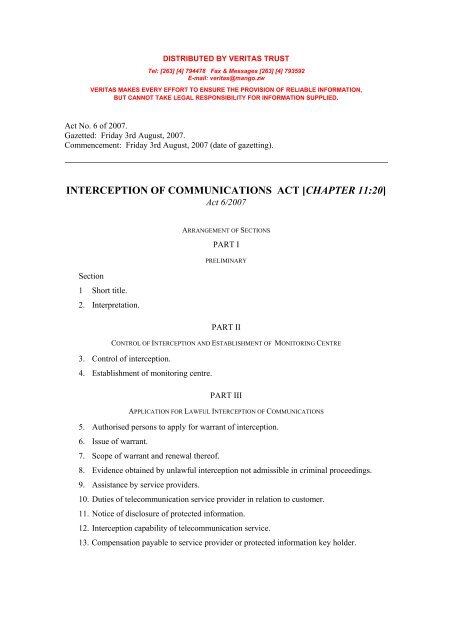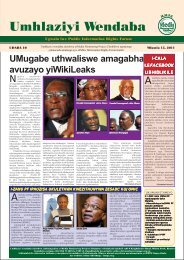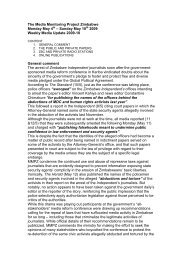Interception of Communications Act Chapter 11-20 - No ... - Kubatana
Interception of Communications Act Chapter 11-20 - No ... - Kubatana
Interception of Communications Act Chapter 11-20 - No ... - Kubatana
You also want an ePaper? Increase the reach of your titles
YUMPU automatically turns print PDFs into web optimized ePapers that Google loves.
[<strong>Chapter</strong> <strong>11</strong>:<strong>20</strong>] <strong>Interception</strong> <strong>of</strong> <strong>Communications</strong> <strong>Act</strong> <strong>No</strong>. 6/<strong>20</strong>07(h) any other information which may be required by the Minister for the Minister to makean appropriate decision.6 Issue <strong>of</strong> warrant(1) A warrant shall be issued by the Minister to an authorised person referred to in section5 if there are reasonable grounds for the Minister to believe that—(a) any <strong>of</strong> the following <strong>of</strong>fences has been or is being or will probably be committed⎯(i)(ii)a serious <strong>of</strong>fence by an organised criminal group; oran <strong>of</strong>fence referred to in the Third Schedule or in paragraph 1, 2, 3, 4, 5, 6, 7 or8 <strong>of</strong> the Ninth Schedule to the Criminal Procedure and Evidence <strong>Act</strong> [<strong>Chapter</strong>9:07];(b) the gathering <strong>of</strong> information concerning an actual threat to national security or to anycompelling national economic interest is necessary; or(c) the gathering <strong>of</strong> information concerning a potential threat to public safety or nationalsecurity is necessary.(2) The Minister may, if he or she is <strong>of</strong> the opinion that the circumstances so require⎯(a) upon an application being made in terms <strong>of</strong> this Part, issue instead <strong>of</strong> a warrant anydirective to a service provider not involving any interception or monitoring <strong>of</strong>communications; or(b) after a warrant has been issued, amend or revoke the warrant.7 Scope <strong>of</strong> warrant and renewal there<strong>of</strong>(1) A warrant shall—(a) subject to subsection (2), be valid for such period not exceeding three months as maybe specified therein but may, for good cause shown by the authorised person, berenewed for a period not exceeding three months⎯(i)(ii)by the Minister in respect <strong>of</strong> a serious <strong>of</strong>fence by an organised criminal groupor for a purpose specified in section 6(1)(b) or (c);by the Minister in consultation with the Attorney-General in respect <strong>of</strong> an<strong>of</strong>fence referred to in the Third Schedule or in paragraph 1, 2, 3, 4, 5, 6, 7 or 8<strong>of</strong> the Ninth Schedule to the Criminal Procedure and Evidence <strong>Act</strong> [<strong>Chapter</strong>9:07];(b) specify the name and address <strong>of</strong> the interception subject and the manner <strong>of</strong>interception;(c) order the service provider to strictly comply with such technical requirements as maybe specified by the agency to facilitate the interception;(d) specify the apparatus and other means that are to be used for identifying thecommunication that is to be intercepted;(e) contain any other necessary details relating to the interception target.(2) Upon expiry <strong>of</strong> a warrant that is renewed in terms <strong>of</strong> subsection (1)(a)(i) or (ii) withinsix months <strong>of</strong> such expiry, the warrant may, for good cause shown by the authorised person, berenewed for a further period not exceeding three months⎯— 6 —
[<strong>Chapter</strong> <strong>11</strong>:<strong>20</strong>] <strong>Interception</strong> <strong>of</strong> <strong>Communications</strong> <strong>Act</strong> <strong>No</strong>. 6/<strong>20</strong>07(a) by the Minister in consultation with the Attorney-General in respect <strong>of</strong> a serious<strong>of</strong>fence by an organised criminal group or for a purpose specified in section 6(1)(b) or(c);(b) by the Administrative Court upon an ex parte application by the authorised personconcerned, in respect <strong>of</strong> an <strong>of</strong>fence referred to in the Third Schedule or in paragraph 1,2, 3, 4, 5, 6, 7 or 8 <strong>of</strong> the Ninth Schedule to the Criminal Procedure and Evidence <strong>Act</strong>[<strong>Chapter</strong> 9:07].(3) Upon expiry <strong>of</strong> a warrant that is renewed in terms <strong>of</strong> subsection (2)(b) or within sixmonths <strong>of</strong> such expiry, the warrant may, for good cause shown by the authorised person, berenewed for a further period not exceeding three months by the Administrative Court upon an exparte application by the authorised person concerned.(4) Every renewal <strong>of</strong> a warrant that is sought within six months <strong>of</strong> the expiry <strong>of</strong> a warrantthat was renewed in terms <strong>of</strong> subsection (2)(a) or (3) or this subsection may be renewed forfurther periods not exceeding three months at a time by the Administrative Court upon an exparte application by the authorised person concerned.(5) An authorised person shall notify the Minister in advance and in writing <strong>of</strong> anyapplication for the renewal <strong>of</strong> a warrant in terms <strong>of</strong> subsection (2)(b), (3) or (4).8 Evidence obtained by unlawful interception not admissible in criminalproceedingsEvidence which has been obtained by means <strong>of</strong> any interception effected in contravention<strong>of</strong> this <strong>Act</strong> shall not be admissible in any criminal proceedings except with the leave <strong>of</strong> thecourt, and in granting or refusing such leave the court shall have regard, among other things, tothe circumstances in which it was obtained, the potential effect <strong>of</strong> its admission or exclusion onissues <strong>of</strong> national security and the unfairness to the accused that may be occasioned by itsadmission or exclusion.9 Assistance by service providers(1) A service provider must ensure that—(a) its postal or telecommunications systems are technically capable <strong>of</strong> supporting lawfulinterceptions at all times in accordance with section 12;(b) it installs hardware and s<strong>of</strong>tware facilities and devices to enable interception <strong>of</strong>communications at all times or when so required, as the case may be;(c) its services are capable <strong>of</strong> rendering real time and full time monitoring facilities for theinterception <strong>of</strong> communications;(d) all call-related information is provided in real-time or as soon as possible upon calltermination;(e) it provides one or more interfaces from which the intercepted communication shall betransmitted to the monitoring centre;(f) intercepted communications are transmitted to the monitoring centre via fixed orswitched connections, as may be specified by the agency;(g) it provides access to all interception subjects operating temporarily or permanentlywithin their communications systems, and, where the interception subject may be— 7 —
[<strong>Chapter</strong> <strong>11</strong>:<strong>20</strong>] <strong>Interception</strong> <strong>of</strong> <strong>Communications</strong> <strong>Act</strong> <strong>No</strong>. 6/<strong>20</strong>07using features to divert calls to other service providers or terminal equipment, access tosuch other providers or equipment;(h) it provides, where necessary, the capacity to implement a number <strong>of</strong> simultaneousinterceptions in order—(i)(ii)to allow monitoring by more than one authorised person;to safeguard the identities <strong>of</strong> monitoring agents and ensure the confidentiality<strong>of</strong> the investigations;(i) all interceptions are implemented in such a manner that neither the interception targetnor any other unauthorised person is aware <strong>of</strong> any changes made to fulfil the warrant.(2) A service provider who fails to give assistance in terms <strong>of</strong> this section shall be guilty <strong>of</strong>an <strong>of</strong>fence and liable to a fine not exceeding level twelve or to imprisonment for a period notexceeding three years or to both such fine and such imprisonment.10 Duties <strong>of</strong> telecommunication service provider in relation to customer(1) Before a telecommunication service provider enters into a contract with any person forthe provision <strong>of</strong> a telecommunication service to that person, it must obtain—(a) the person’s full name, residential address, business address and postal address and hisor her identity number contained in his or her identity document;(b) in the case where the person is a business organisation, its business name and addressand the manner in which it is incorporated or registered;(c) any other information which the telecommunication service provider deems necessaryfor the purpose <strong>of</strong> enabling it to comply with this <strong>Act</strong>.(2) A telecommunication service provider must ensure that proper records are kept <strong>of</strong> theinformation referred to in subsection (1) and any change in such information.<strong>11</strong> <strong>No</strong>tice <strong>of</strong> disclosure <strong>of</strong> protected information(1) If an authorised person believes on reasonable grounds—(a) that a key to any protected information is in the possession <strong>of</strong> any person; and(b) that the imposition <strong>of</strong> a disclosure requirement in respect <strong>of</strong> the protected informationis necessary—(i)(ii)(iii)andin the interests <strong>of</strong> national security; orfor the purpose <strong>of</strong> preventing and detecting a serious <strong>of</strong>fence; orin the interests <strong>of</strong> the economic well-being <strong>of</strong> Zimbabwe;(c) that the imposition <strong>of</strong> such a requirement is proportionate to what is sought to beachieved by its imposition; and(d) that it is not reasonably practicable for the authorised person to obtain possession <strong>of</strong>the protected information in an intelligible form without giving the notice under thissection;the authorised person may by notice to the person whom he or she believes to have possession<strong>of</strong> the key, impose a disclosure requirement in respect <strong>of</strong> the protected information.— 8 —
[<strong>Chapter</strong> <strong>11</strong>:<strong>20</strong>] <strong>Interception</strong> <strong>of</strong> <strong>Communications</strong> <strong>Act</strong> <strong>No</strong>. 6/<strong>20</strong>07(2) A notice under this section imposing a disclosure requirement in respect <strong>of</strong> anyprotected information must—(a) be in writing; and(b) describe the protected information to which the notice relates; and(c) specify why the protected information is required; and(d) specify a reasonable time by which the notice is to be complied with; and(e) set out the disclosure that is required by the notice and the form and manner in which itis to be made.(3) A notice under this section shall not require the making <strong>of</strong> any disclosure to any personother than—(a) the person giving the notice; or(b) such other person as may be specified in or under the notice.(4) A person to whom a notice has been given in terms <strong>of</strong> this section and who is inpossession <strong>of</strong> both the protected information and the key thereto must—(a) use any key in his or her possession to provide access to the information;(b) in providing such information, make a disclosure <strong>of</strong> the information in an intelligibleform.(5) If a person to whom a notice has been given is in possession <strong>of</strong> different keys, orcombinations <strong>of</strong> keys, to the protected information—(a) it shall not be necessary for purposes <strong>of</strong> complying with the notice for the person givennotice to disclose any keys in addition to those the disclosure <strong>of</strong> which, alone, aresufficient to enable the authorised person to obtain access to the protected informationand to put it in an intelligible form;(b) the person given notice may select which <strong>of</strong> the keys or combination <strong>of</strong> keys may beused for complying with the notice.(6) If a person to whom a notice has been given—(a) has been in possession <strong>of</strong> any key to the protected information, but no longerpossesses it; and(b) has information that will facilitate the obtaining or discovery <strong>of</strong> the key to protectedinformation;he or she must disclose the information referred to in paragraph (b) to the authorised person.(7) An authorised person to whom a key has been disclosed under this section must—(a) use the key only in respect <strong>of</strong> the protected information, and in the manner and for thepurposes specified in the notice; and(b) on or before the expiry <strong>of</strong> the period or extended period for which the notice has beenissued, destroy all records <strong>of</strong> the disclosed key if, in the opinion <strong>of</strong> the authorisedperson—(i)(ii)no criminal proceedings or civil proceedings will be instituted in connectionwith such records; orsuch records will not be required for any criminal or civil proceedings.— 9 —
[<strong>Chapter</strong> <strong>11</strong>:<strong>20</strong>] <strong>Interception</strong> <strong>of</strong> <strong>Communications</strong> <strong>Act</strong> <strong>No</strong>. 6/<strong>20</strong>0713 Compensation payable to service provider or protectedinformation key holder(1) The Minister, after consultation with the Authority, shall by notice in the Gazetteprescribe—(a) the forms <strong>of</strong> assistance given by a service provider or protected information key holderin the execution <strong>of</strong> a warrant, notice or directive issued in terms <strong>of</strong> this <strong>Act</strong> for which itmust be compensated by the State; and(b) reasonable tariffs <strong>of</strong> compensation payable to a service provider or protectedinformation key holder for providing the forms <strong>of</strong> the assistance referred to inparagraph (a).(2) The forms <strong>of</strong> assistance referred to in subsection (1)(a) must include, in the case <strong>of</strong>—(a) a telecommunication service provider, the making available <strong>of</strong> a facility, device ortelecommunication system; and(b) a protected information key holder—(i)(ii)the disclosure <strong>of</strong> the key; andthe provision <strong>of</strong> assistance in rendering intelligible the protected information.(3) The tariffs prescribed under subsection (1)(b)—(a) may differ in respect <strong>of</strong> different categories <strong>of</strong> service providers or protectedinformation key holders;(b) must be uniform in respect <strong>of</strong> each service provider or protected information keyholder falling within the same category.(4) The compensation payable to a service provider or protected information key holdershall only be for direct costs incurred in respect <strong>of</strong> personnel and administration which arerequired for purposes <strong>of</strong> providing any <strong>of</strong> the forms <strong>of</strong> assistance referred to in subsection(1)(a).PART IVPOSTAL ARTICLES14 Application for detention order(1) If an authorised person suspects on reasonable grounds that a postal article in thecustody <strong>of</strong> a postal service provider—(a) contains anything in respect <strong>of</strong> which an <strong>of</strong>fence or attempted <strong>of</strong>fence is beingcommitted; or(b) contains anything that will afford evidence <strong>of</strong> the commission <strong>of</strong> an <strong>of</strong>fence; or(c) is being sent to further the commission <strong>of</strong> an <strong>of</strong>fence; or(d) needs to be obtained and examined in the interests <strong>of</strong> defence, public safety or publicorder;he or she may apply to the Minister for a detention order to detain the postal article for thepurpose <strong>of</strong> examination.— <strong>11</strong> —
[<strong>Chapter</strong> <strong>11</strong>:<strong>20</strong>] <strong>Interception</strong> <strong>of</strong> <strong>Communications</strong> <strong>Act</strong> <strong>No</strong>. 6/<strong>20</strong>07(2) If the Minister, by written order to the authorised person and the postal serviceprovider, certifies that it is necessary for any <strong>of</strong> the purposes specified in subsection (1)(a), (b),(c) or (d) for a postal article in the postal service provider’s custody to be detained and, if sorequired by the order, opened and examined, the postal service provider shall forthwith detainthe postal article.(3) Section 5 shall apply with such changes as may be necessary to the informationrequired to be furnished to the Minister before a detention order is issued.15 Examination <strong>of</strong> and accountability for detained postal articles(1) On the day appointed by or under a detention order the authorised person shall, in thepresence <strong>of</strong> a representative <strong>of</strong> the postal service provider, examine the detained postal article.(2) If, on examination <strong>of</strong> a postal article in terms <strong>of</strong> subsection (1), the suspicion that gaverise to its examination—(a) is substantiated, the postal article may be detained for the purposes <strong>of</strong> evidence in acriminal prosecution or destroyed or dealt with in such other manner as may beauthorised in the detention order;(b) is not substantiated, the postal article shall be delivered to the person to whom it isaddressed or to his or her representative on payment <strong>of</strong> any postage payable thereon.PART VGENERAL16 Restriction on disclosure(1) <strong>No</strong> person may disclose any communication or information which he or she obtained inthe exercise <strong>of</strong> his or her powers or the performance <strong>of</strong> his or her duties in terms <strong>of</strong> this <strong>Act</strong>except—(a) to any other person who <strong>of</strong> necessity requires it for the like exercise or performance <strong>of</strong>his or her functions in terms <strong>of</strong> this <strong>Act</strong>;(b) information which is required to be disclosed in terms <strong>of</strong> any law or as evidence in anycourt <strong>of</strong> law.(2) <strong>No</strong>—(a) service provider or protected information key holder may disclose any informationwhich it obtained in compliance with this <strong>Act</strong>; or(b) employee <strong>of</strong> a service provider or protected information key holder may disclose anyinformation which he or she obtained in the course <strong>of</strong> his or her employment andwhich is connected with the exercise <strong>of</strong> any power or the performance <strong>of</strong> any duty interms <strong>of</strong> this <strong>Act</strong>.(3) Any person who discloses any information in contravention <strong>of</strong> subsection (1) or (2)shall be guilty <strong>of</strong> an <strong>of</strong>fence and liable to a fine <strong>of</strong> not exceeding level fourteen or toimprisonment for a period not exceeding five years or to both such fine and such imprisonment.— 12 —
[<strong>Chapter</strong> <strong>11</strong>:<strong>20</strong>] <strong>Interception</strong> <strong>of</strong> <strong>Communications</strong> <strong>Act</strong> <strong>No</strong>. 6/<strong>20</strong>0717 Disposal <strong>of</strong> intercept productSubject to sections <strong>11</strong>(7)(b) and 15(2), an authorised person shall destroy as soon aspossible after it is used for the purposes <strong>of</strong> this <strong>Act</strong> any intercepted communication.18 Appeals(1) Any person who is aggrieved by a warrant, a directive referred to in section 6(2)(a) or adirective or order issued to or by the Authority, an authorised person or the agency may appealto the Administrative Court within one month <strong>of</strong> being notified or becoming aware <strong>of</strong> it, as thecase may be.(2) The Administrative Court may in any appeal confirm, vary or set aside the warrant,directive or order appealed against and may make such order as to costs as it thinks fit.(3) For the avoidance <strong>of</strong> doubt, the Administrative Court is an “adjudicating authority” forthe purposes <strong>of</strong> the Courts and Adjudicating Authorities (Publicity Restriction) <strong>Act</strong> [<strong>Chapter</strong>7:04] when considering any appeal in terms <strong>of</strong> this section.19 Review <strong>of</strong> exercise <strong>of</strong> Minister’s powers under this <strong>Act</strong>(1) <strong>No</strong> later than three months after the end <strong>of</strong> each calendar year the Minister shall submitfor review by the Attorney-General a written summary <strong>of</strong> the particulars <strong>of</strong> every warrantwhich, during that calendar year, was issued by him or her but not renewed in terms <strong>of</strong> section7(1)(a)(i) or (ii), (2), (3) or (4).(2) On receiving the summary referred to in subsection (2) the Attorney-General mayrequest further particulars in relation to any warrant mentioned in the summary, and theMinister shall comply as soon as practicable with any such request.(3) Upon reviewing the summary referred to in subsection (2), together with any furtherparticulars provided in compliance with subsection (3), the Attorney-General may makerecommendations in writing to the Minister concerning the manner in which the Minister shallexercise his or her powers in future generally or with respect to the issuance <strong>of</strong> any class <strong>of</strong>warrant, and the Minister shall comply with such recommendations.<strong>20</strong> RegulationsThe Minister may make regulations providing for all matters which by this <strong>Act</strong> are requiredor permitted to be prescribed or which, in his or her opinion, are necessary or convenient to beprescribed for carrying out or giving effect to this <strong>Act</strong>.— 13 —
















